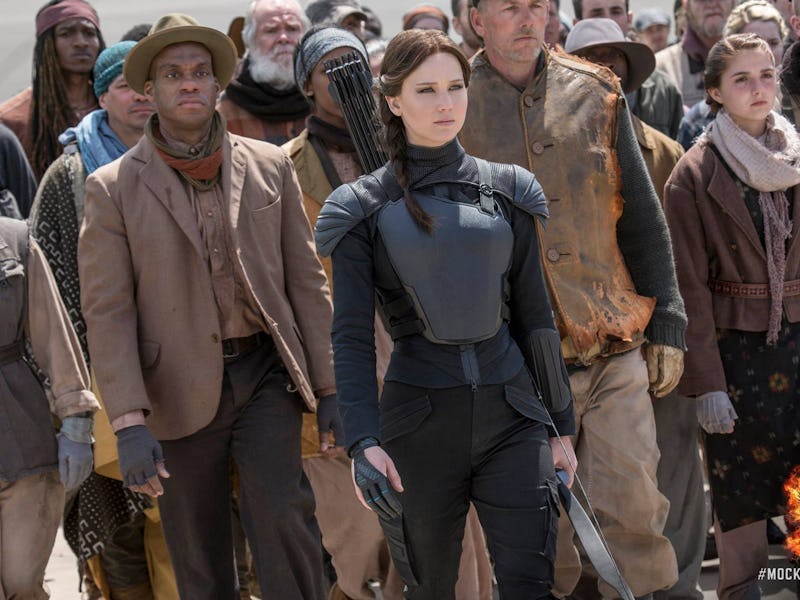'The Hunger Games: Mockingjay Part 2' Did Not Succumb to Blockbuster Fatigue
'Vanity Fair' writer John Lopez argues an audience exhausted by mega-movies is the reason for its less-than-expected weekend box office. He's wrong.

In a recent Vanity Fair article writer John Lopez attributes the opening weekend box office performance of The Hunger Games: Mockingjay: Part 2 to that old chestnut, blockbuster fatigue. Audiences are too overwhelmed by the spectacle of big budget cinema to care anymore. Really? To that I simply say: Star Wars.
Here’s the deal. Lopez crunches numbers, invoking huge disparities between this film’s opening weekend takehome of $101 million and that of its predecessors. Mockingjay Part 2 is “a financial low ebb” in context of the series at large. I can’t argue with facts. I can however, argue with his reasons. There’s something bigger at fault than the obvious cultural signposts Lopez points toward. A Forbes article outlining the finale’s grim, war-torn narrative as culprit. References to the recent Paris attacks, assuming the public’s overexposure to violence is a likely cause for aversion. Why would anyone want to step into a cinema to see the atrocity of conflict when they can switch on the news? he supposes. If that’s the case then I can only assume that Lopez hasn’t watched the news in decades. It’s lazy and misguided. Oh, and then he drops this gem:
“When’s the last time any film with such a profoundly difficult moral outlook and unsparing commentary on human savagery opened to $100 million?”
Uh, the first Hunger Games?
He cites public tolerance for this type of fare — maxed-out in his estimation — as another source of blame. “The fields of our enthusiasm have been duly over-farmed by Hollywood’s mega-blockbuster mentality.” Purveyors of high culture might pray for the death of blockbusterism, hoping that at some point Marvel will be toppled, crushed into history by a sleeper indie. With Captain America: Civil War on the cusp of confirming Marvel as the big-hit factory, that type of outcome is not just unlikely, it’s unwanted. The mega-blockbuster is here to stay.
What if the real cause of Mockingjay Part 2’s less-than-impressive box office decline has nothing to do with public exhaustion? What if it’s due to good old storytelling? Storytelling styles tend to remain the same in big budget circles: action! stars! trailer moments! Don’t rock the boat, and all that. But franchises of this caliber must sustain audience interest over an extended period of time. Imagine waiting a year for the next episode of your favorite TV show. It’s unfathomable, right? Splitting up long-form narratives into annual movies requires fresh, unique story choices. Ones that refuse to mine the same tropes over and over, in hopes of a repeat success. Perhaps a last-minute revelation that strikes in the final reel. Or just a damn good story that makes you crave more.
That’s not to say The Hunger Games is just a load of set-pieces strung together by a vague ‘rage against the machine’ ideal. There is a story. And at times it pushes along with compulsion. Yet Katniss’ tale really succeeds in what it tells us about ourselves, our times, than it does about her specific trajectory. Because it’s simply taken too long to arrive at the scorched ruins of the Capitol. Other blockbuster franchises have avoided this pitfall. Harry Potter and Lord of the Rings, to name but two, taught us to look into the future. Teasing us with what happens next through its harmonious union of story, character, and theme.
And this is where we get to it. What drives The Hunger Games isn’t its narrative. It’s a universal theme: challenge authority. Katniss’ arc hurtles along those iconoclastic lines. She’s a lowly farm gal. She’s a role model for her district. She’s an emblem for change in dark times. The path she takes is well-trod, outlined by Joseph Campbell in the hero’s journey model. Her purpose? To guarantee a triumph.
It’s grand, glorious, tear-jerking even. It’s just too late. Mockingjay: Part 1 is two-thirds of a movie. Events were established, left to set and dry for a year, until the final action act twelve months later. There’s a case for dividing movies, when the subject matter is simply too dense to delineate through one single feature. To call on the Potter franchise again, its double-part finale positively hummed. I’m not even a fan but that decision to divide worked to better service the material, and the fans. No-one wanted Harry’s last hurrah to get short-changed. Mockingjay isn’t a doorstopper in need of division. A three-hour long movie, replete with the best of its novel would have done it justice. Instead it was spread too thin, across too many years to boost studio coffers.
Lopez avoids turning to the actual films to find an answer. This was never about audiences growing tired of blockbusters, but a public tired of the way they’re presented. We’re in a culture of immediacy, desperate to have what we want, when we want it. Which is right now. If we’re struggling to be patient waiting for an app to refresh, then perhaps that provides some answers regarding the franchise’s box office decline. The Hunger Games took four years to give us a resolution. For audiences, closure on that journey wasn’t worth the wait.